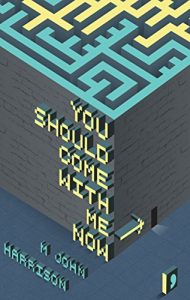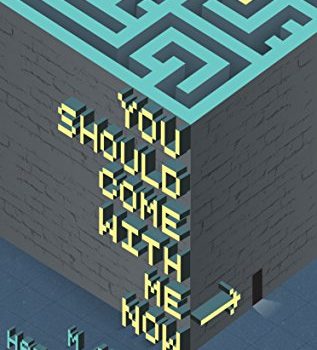Gary K. Wolfe Reviews You Should Come With Me Now: Stories of Ghosts by M. John Harrison
 You Should Come With Me Now: Stories of Ghosts, M. John Harrison (Comma Press 978-1-910-97434-6, £9.99, 272pp, tp) November 2017.
You Should Come With Me Now: Stories of Ghosts, M. John Harrison (Comma Press 978-1-910-97434-6, £9.99, 272pp, tp) November 2017.
“I’m moving forward into something here,” thinks the main character in M. John Harrison’s story “Yummie”, “but I don’t know what it is.” That’s a pretty succinct description of what it feels like to enter many of the stories and sketches in You Should Come With Me Now: Stories of Ghosts, Harrison’s first new collection in 15 years. China Miéville once compared Harrison’s stories to his other well-known passion, rock-climbing: the point is never simply to get to the top, but the strategies for getting there can be important. Of the 42 pieces included, 18 are full stories, and fewer than a dozen of those have appeared in print before; others come from performances, readings, and Harrison’s own blog. The performative aspect of many of the pieces is probably no accident: Harrison seems to have arranged them more as a concert than a simple collection, with themes appearing, being subordinated, and reappearing in altered forms. The opening one-paragraph piece “Lost and Found”, for example, is a brief overture, describing a shop filled with cultural detritus: “Put your face up against the window on a dark night and a rain of silent objects drifts down… like the index of some unreliable past” – much like the stories we are about to read.
This is followed by “In Autotelia”, which takes us to what is the closest thing we are going to find here to a recognizably SF setting, a rather mysterious European city or state sometime after an apparent cataclysm. Here the narrator takes the train from Waterloo station past “where Norwich used to be” to conduct “medical checks.” It’s only a three-hour train ride, but later, in “Cave and Julia”, it takes the journalist Cave five hours to fly there from Heathrow on a 787 Dreamliner (a plane whose name Harrison seems to find irresistible, since it recurs often), though again there’s the suggestion of a vaguely transformed future, as we’re told that Autotelia is “congruent with what we used to know as the North Sea,” that it’s “a place which is both here and not here,” and that it was “once inhabited by something neither human nor pre-human.” There’s really no point in trying to reconcile this in any traditional world-building sense, and one reason may be the name Autotelia itself, which apparently comes from a term T.S. Eliot once used to describe a thing that exists for its own sake, without external referents. Autotelia is only what the story needs it to be.
So trying to fit Harrison’s beautifully detailed but dreamlike landscapes into a traditional SF or fantasy template is about as useless as trying to read them as mainstream realistic fiction. A similar location is the Ambiente Hotel, which features here mostly in “The Theory Cadre”, one of three stories presented in more or less independent segments. The hotel is the most direct example of what Harrison means in his subtitle, “Stories of Ghosts”: objects are moved mysteriously at night, lights and computers switch themselves on, most of the guests are invisible (or “stored in humane conditions”), and the hotel once hosted a “Theory Cadre” including a historian named K and a literary theorist named Fennel, who rather tellingly advises her creative writing workshop that “in every ‘story’ we tell, our ambition should be to achieve a calculated failure of service, a single perfect interruption of traffic.” Harrison is both generous and shrewdly misleading in offering such suggestive hints about what to expect from his fiction.
Two elements are consistent throughout. Harrison’s preternaturally vivid sense of place, and his portrayal of lonely, haunted characters whose dreams and memories seem to invade their waking lives, which they don’t quite know how to inhabit. “Cave and Julia”, one of the strongest stories in the book, describes the intermittent relationship of the journalist Cave and the failed film actress Julia, who has exiled herself to Autotelia, where her brother disappeared under murky circumstances years earlier. Both are almost equally evident in “Cicisbeo”, whose narrator becomes involved with an old friend whose husband has taken to obsessively remodeling his loft, and which ends with a startling fantasy image that tells us much about such relationships. A strained marriage is also at the center of one of Harrison’s few direct nods to genre, “The Good Detective”, whose narrator tries to track down a missing husband.
While horror isn’t a genre with which Harrison is usually associated, he shows an unnerving skill at disturbing pathologies. In another of the best stories, “Entertaining Angels Unawares”, the narrator takes a job helping to restore an old church, but grows preoccupied with the graves of children in the adjoining cemetery, while his work partner obsessively dreams of decapitating children – a dream which the narrator eventually decides he wants to be part of. In “Not All Men” – one of a couple of stories that could serve as workshop examples of the difficult second-person voice – the narrator denies his ex’s claims of repeatedly seeing him on trains and in public, which she tries to prove by sending him murky video files; it’s a bit harder to figure out which character is creepier. In “Getting Out of There”, the last full story in the collection, a man returns to his childhood village and begins a relationship with an old school friend – though pretty soon he begins stalking her at night, and grows convinced that other anonymous figures are stalking her as well.
Many of the more direct allusions to SF and fantasy in the collection are in the form of fairly minor one-page parodies, taking on pulp space heroes in “Earth Advengers”, presenting a 50-word space opera in “Anti-Promethean”, or describing an alien invasion after humanity is extinct in “Jackdaw Bingo”. Much the same can be said of his approach to genre fantasy, dismissed in a couple of short pieces about Elf Land, which are nevertheless enough to imply an entire bad trilogy. There are also some witty and acerbic observations about genre conventions in “Imaginary Reviews” – exactly what the title says – which touches upon a number of genre conventions, from near-future thrillers, to alien invasions and alternate histories. More substantial is “The Crisis” – another second-person tale, set mostly among London’s street people – which describes an invasion of aliens called the “iGhetti,” which resemble “stalks of fleshy, weak rhubarb” that “leaked into our world from the astral plane.” As you might expect, though, Harrison doesn’t play this out as any sort of traditional invasion tale, but rather as yet another elliptical means of examining the chronic disorientation of his characters. That this remains a favorite Harrison theme is suggested by the most recent story here, “Yummie”, in which a recovering heart attack patient finds himself haunted by a round-headed man who first appears in his hospital room asking for someone named Yummie. Do we ever actually find out who Yummie is and what he wants? That’s the wrong question to be asking of a Harrison story, but if you are willing to follow the sometimes apparently random breadcrumb trails that Harrison uses for plots, you can find yourself in a space somewhere outside of genre altogether, even outside of conventional narrative, but one that can leave you feeling as though you’ve just awoken from a strange and vivid dream, and that, at its best – which it often is here – can be ineluctably brilliant.
Gary K. Wolfe is Emeritus Professor of Humanities at Roosevelt University and a reviewer for Locus magazine since 1991. His reviews have been collected in Soundings (BSFA Award 2006; Hugo nominee), Bearings (Hugo nominee 2011), and Sightings (2011), and his Evaporating Genres: Essays on Fantastic Literature (Wesleyan) received the Locus Award in 2012. Earlier books include The Known and the Unknown: The Iconography of Science Fiction (Eaton Award, 1981), Harlan Ellison: The Edge of Forever (with Ellen Weil, 2002), and David Lindsay (1982). For the Library of America, he edited American Science Fiction: Nine Classic Novels of the 1950s in 2012, with a similar set for the 1960s forthcoming. He has received the Pilgrim Award from the Science Fiction Research Association, the Distinguished Scholarship Award from the International Association for the Fantastic in the Arts, and a Special World Fantasy Award for criticism. His 24-lecture series How Great Science Fiction Works appeared from The Great Courses in 2016. He has received six Hugo nominations, two for his reviews collections and four for The Coode Street Podcast, which he has co-hosted with Jonathan Strahan for more than 300 episodes. He lives in Chicago.
This review and more like it in the December 2017 issue of Locus.







